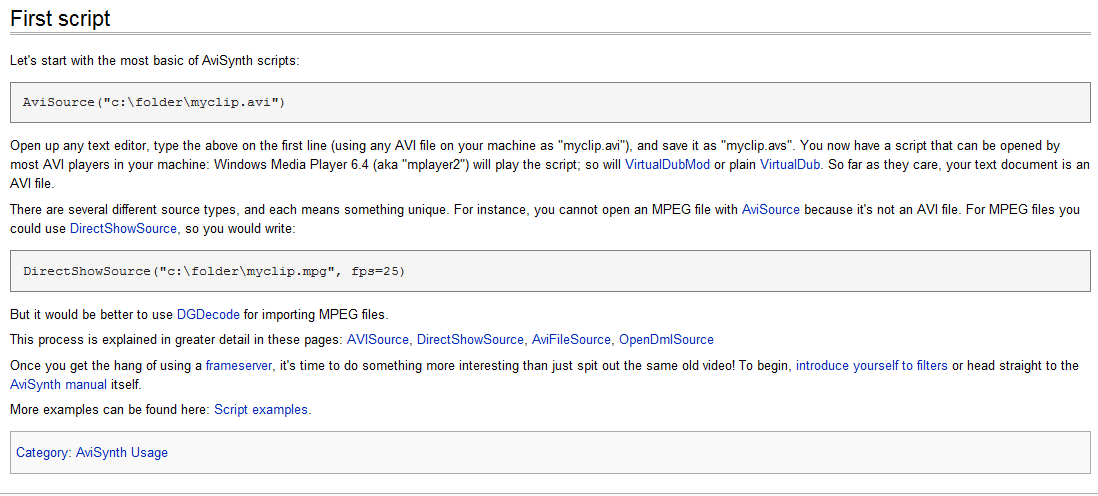
- #AVISYNTH SCRIPT.AVS HOW TO#
- #AVISYNTH SCRIPT.AVS MANUAL#
- #AVISYNTH SCRIPT.AVS FREE#
- #AVISYNTH SCRIPT.AVS WINDOWS#
Since the VC++ runtime libraries are basically universally required there should be no need to have the libraries statically loaded.

Also having things static and the individual files means using space on the hard drive that really isn't required. The real issue with this is that newer versions of the runtime libraries fix bugs and improve stability, possibly improve performance, and close security holes.

The same goes with programs with the VC++ libraries in their folder, the program will use that version instead of the one on the system. Static libraries give the benefit that you don't need to have other stuff installed, but the downside is that it will most likely be an outdated version of that library (say, VS2010). Testing, documenting, and giving any kind of feedback is also a great help.īoth static and dynamically loaded libraries have their advantages and disadvantages.
#AVISYNTH SCRIPT.AVS FREE#
Feel free to work on any feature you'd like, or if you are feeling unsure where to start, choose an open issue from the GitHub page. Let us know what you're working on either here or on #avs-plus on Rizon, and join the discussions. This is a community project and you are welcome to work on improving Avisynth+. OR alternatively to the above steps: For people who prefer to compile from the command line, qyot27 was kind enough to provide detailed compilation instructions from an Msys environment. Load generated VC++ solution and compile.
#AVISYNTH SCRIPT.AVS MANUAL#
No manual changes to CMake variables are necessary, just hit Configure, select yout compiler then Generate. Get Visual Studio 2013 Community Version.
#AVISYNTH SCRIPT.AVS HOW TO#
How to compile (without DirectShowSource) Ability to load VFAPI filters is missing, hopefully temporarily. However, TCPDeliver from official Avisynth can be used with Avisynth+. TCPDeliver not included in the sources.
#AVISYNTH SCRIPT.AVS WINDOWS#
Support for Windows 98/Me/2000 dropped. The contrary however might not be true: Plugins and scripts written explicitly to take advantage of Avisynth+ might not work using the official Avisynth. This means you should be able to use plugins and scripts written for Avisynth without any problems with Avisynth+. All in all, I recommend you use the Avisynth+ installer instead, which will take care of all these problems for you.Īvisynth+ tries to provide a superset of Avisynth's features while staying compatible to existing code. And last but not least, this will make your Avisynth and Avisynth+ plugins mix in the same folders, which you might not want (though it is harmless ATM). Avisynth+ uses a different C++ runtime, which needs to be installed separately. In Avisynth+ some core plugins have been moved to external plugin DLLs (but are still shipped with the core), so you'll manually need to copy those too. Your existing plugins will be kept in both cases.Ĭan I just replace the old avisynth.dll with the new one from AviSynth+? In the first case you'll be able to switch back to classic AviSynth by simply uninstalling AviSynth+.

If classic AviSynth is already installed, you will be offered the choice of either upgrading or replacing it. Use installer for the latest release from here. Leaner and more logical project structure Easy and fast compilation, with current compilers … and more to come as development continues Improved still image support and TimeStretch Script language extensions, with support for multiline conditionals and loops. Support for multiple ("shadow") plugin directories Faster script startup and substantially faster core filters [Download: From GitHub (use version with vc_redist when installing for the first time)

Code: C:\FFmpeg32>ffmpeg -i "colorbands_709_420.avs"įfmpeg version N-86383-g4705edb Copyright (c) 2000-2017 the FFmpeg developersĬonfiguration: -enable-gpl -enable-version3 -enable-cuda -enable-cuvid -enable-d3d11va -enable-dxva2 -enable-libmfx -enable-nvenc -enable-avisynth -enable-bzlib -enable-fontconfig -enable-frei0r -enable-gnutls -enable-iconv -enable-libass -enable-libbluray -enable-libbs2b -enable-libcaca -enable-libfreetype -enable-libgme -enable-libgsm -enable-libilbc -enable-libmodplug -enable-libmp3lame -enable-libopencore-amrnb -enable-libopencore-amrwb -enable-libopenh264 -enable-libopenjpeg -enable-libopus -enable-librtmp -enable-libsnappy -enable-libsoxr -enable-libspeex -enable-libtheora -enable-libtwolame -enable-libvidstab -enable-libvo-amrwbenc -enable-libvorbis -enable-libvpx -enable-libwavpack -enable-libwebp -enable-libx264 -enable-libx265 -enable-libxavs -enable-libxvid -enable-libzimg -enable-lzma -enable-zlibĬolorbands_709_420.avs: Unknown error occurred Which file that I can rename? I tried to rename ffmpeg.exe to ffmpeg32.exe and run the code, but it didn't work.The pinterf fork was integrated in main line like AviSynth+ 3.4.0


 0 kommentar(er)
0 kommentar(er)
